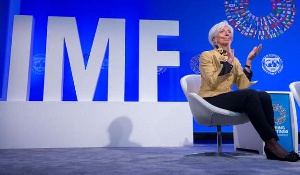The International Monetary Fund (IMF) has identified five major threats to Ghana’s ongoing economic recovery, which could significantly slow the accelerating growth rate.
The Fund has presented them to government and other stakeholders in the form of a Ghana Risk Assessment Matrix which identifies the nature and sources of the risks, assesses their relative likelihood of their happening and their expected impact if realized; and recommends policies to mitigate the risks.
Instructively some of the risks identified are in fact already occurring.
Since Ghana’s Extended Credit Facility programme with the IMF has expired at the beginning of this month, government is not under any obligation to implement the recommendations but it is instructive that government is taking them, at least where they do not overly emphasize demand management over the supply side expansionary economic policies it has committed to.
The IMF has categorized the relative likelihood of each risk as either high, medium or low, with the same categorizations used to assess the expected impact if the risk is realized.
The biggest danger for Ghana’s economic recovery, according to the IMF is that of a sharp tightening of global financial conditions, which the Fund warns would cause higher debt service and refinancing risks, as well as stress on vulnerable sovereign bond issuances and those with un-hedged dollar exposures. The IMF rates the likelihood of this as high – meaning a probability of between 30 and 50 percent – because government’s financing needs remain sizable (though declining); and reliance on non-resident investors is high.
The IMF reckons that the expected impact if this happens is similarly high. Failure to secure financing would call for higher interest rates, further dampening growth and exacerbating fiscal cost and debt dynamics.
Instructively this is actually happening, forcing coupon rates offered on Ghana’s medium to long term debt upwards. Furthermore, reduced external financing would erode foreign exchange buffers and possibly put pressure on the exchange rate and inflation. Again this has been happening, although Ghana’s recent US$3 billion Eurobond issuance has provided some respite.
To mitigate this risk, the Fund recommends the implementation of a credible medium term fiscal adjustment strategy to bolster investors confidence, the building of forex buffers to enhance resilience (also being done); and the formulation and adoption of contingency measures in case financing conditions tighten further and more adjustment is needed.
The other threat whose likelihood of occurrence and expected impact are both rated high is fiscal loosening in the run-up to the 2020 elections. Asserts the IMF report: “Political pressures to spend more and tax less are evident and Ghana has de facto entered pre-election campaign.”
This threat could result in further payment arrears accumulation and thus increasing non-performing loans as well as strained public service provision. The resultant lack of confidence in government could trigger pressures on the exchange rate, affecting inflation, balance sheets and debt sustainability.
The IMF therefore recommends medium term fiscal adjustment balancing measures that cut spending and increase revenues.
The other threat with high potential of actually happening however, would only have a medium impact. This is the continued and intensifying weaknesses of the state owned utility providers, which continue to make significant losses and thus could add to government’s risk of debt distress and constrain growth. The Fund therefore calls for a credible strategy to tackle energy sector inefficiencies, while monitoring and oversight of SOEs are strengthened.
The other two identified major threats are assessed to have only medium likelihood of actually occurring meaning a possibility of between 10 and 30 percent.
One is a significant drop in oil prices if global growth slows or supply exceeds expectations. However the expected impact would be high, resulting in a sharp contraction in exports and falling international reserves, these creating pressures on the exchange rate and inflation.
The other is financial stability problems arising from liquidity problems, the large stock of non-performing loans ad capital shortfalls in some parts of the financial sector. The IMF rates the expected consequences of this as medium too, by limiting lending to the private sector and thus lowering investment and growth.
To prevent this, the IMF recommends the addressing of banking sector weaknesses, including resolution of distressed firms and tackling NPLs. Again this is already being done through the Bank of Ghana
Business News of Saturday, 27 April 2019
Source: goldstreetbusiness.com













